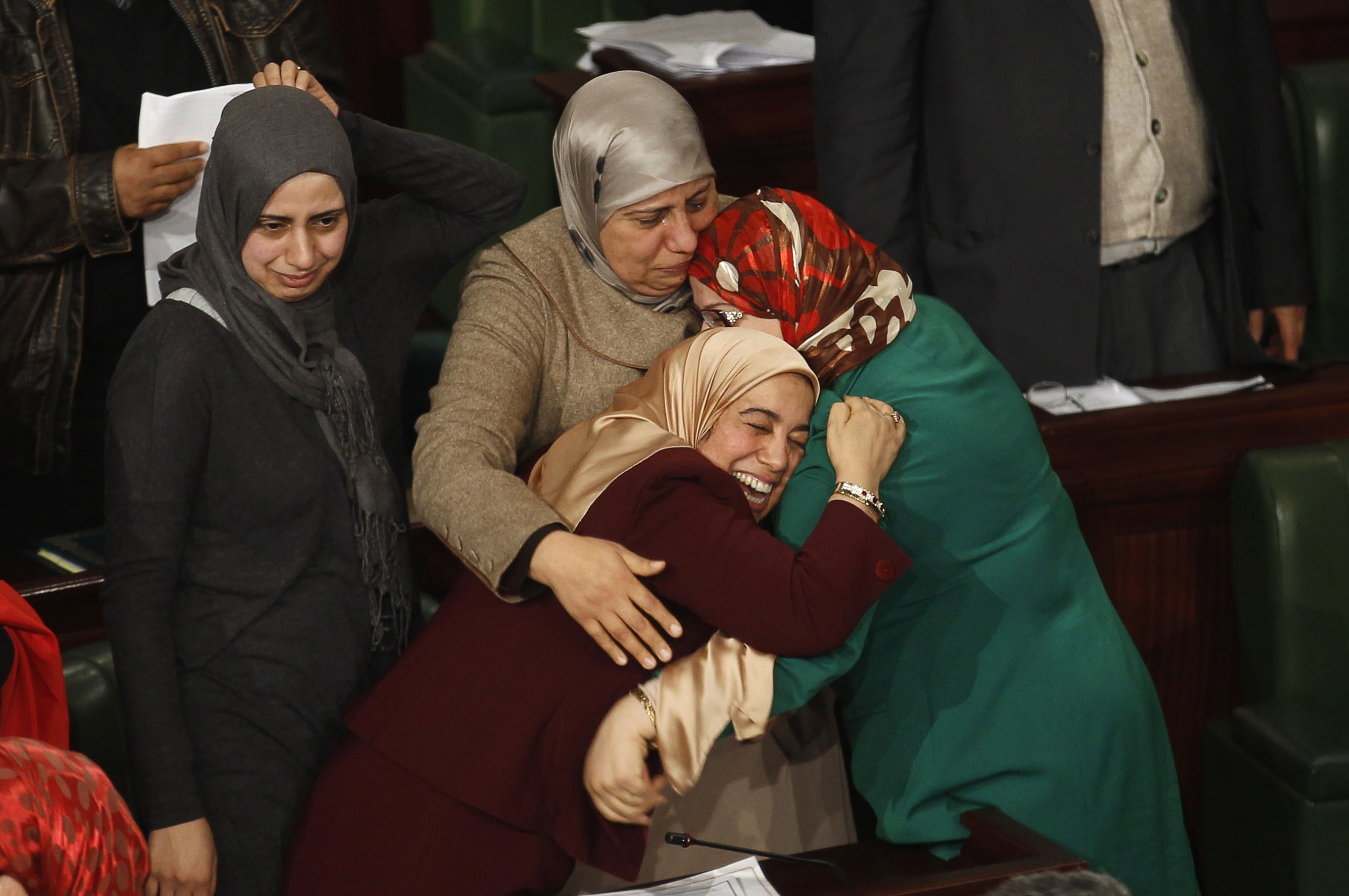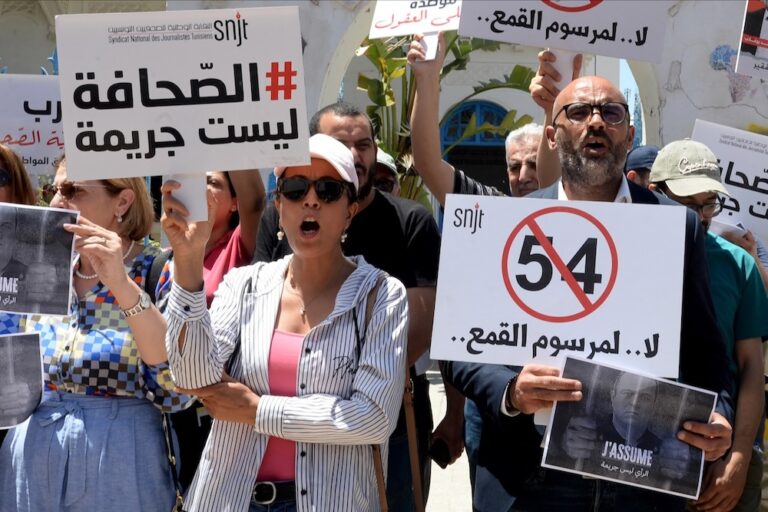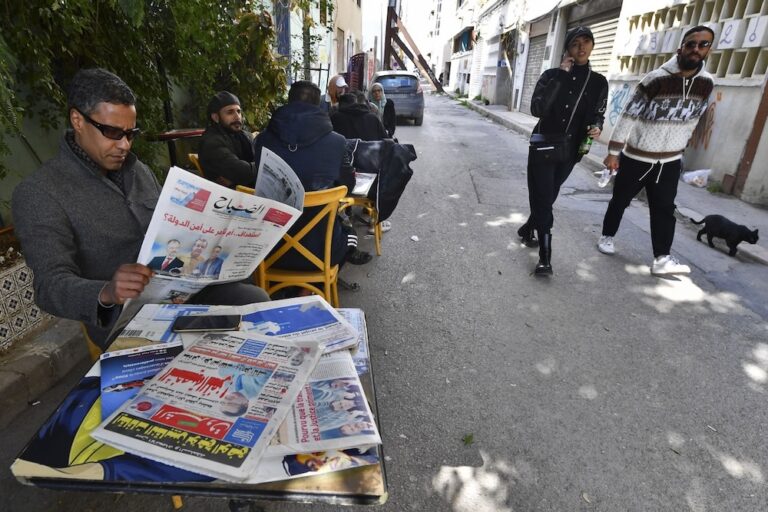Media self-regulation becomes a key component of Tunisia’s new constitution.
After debates held in a spirit of consensus, Tunisia’s national constituent assembly has approved a new constitution that tries to protect the democratic rights to freedom of expression and information. It was adopted by 200 votes for, 12 against and 4 abstentions on 26 January.
Although article 31 on freedom expression, article 32 on access to information, and article 127 on the Broadcasting Communication Agency are not entirely satisfactory, they represent a significant advance.
“We hail the realization of one of the leading goals of the 2011 popular uprising,” Reporters Without Borders secretary-general Christophe Deloire said. “The completion of the constitutional process that began after the October 2011 elections marks a turning point for Tunisia.
“Ben Ali’s departure opened the way for media pluralism but the repressive laws inherited from the old regime were maintained. Freedom of information is now enshrined in the constitution. This is crucial for democracy in Tunisia but it is not enough.”
Reporters Without Borders legal committee coordinator Prisca Orsonneau added: “If article 31 of the constitution guaranteeing freedom of expression is to be fully respected, as Tunisia’s international obligations require, legislators, judicial officials, security forces and other leading actors must act in concert with the constant aim of respecting and ensuring respect for the principle of freedom of information.”
The utmost vigilance is needed to ensure implementation of the constitution’s principles. In early December, Reporters Without Borders pointed out the inadequacies of the draft being discussed.
Thereafter, few amendments were adopted to improve or clarify the wording of the articles on freedom of information, except article 125, which was amended to restrict the powers of the broadcast media regulator. Amendments reintroducing a ban on blasphemy (article 6) and the addition of the concept of “public morals” (article 49) are also worrying as both could restrict freedom of expression.
After following the voting article by article, Reporters Without Borders stresses the following points:
- Article 6, on religion, guarantees freedom of conscience.
The state’s neutrality is not enshrined in the constitution as finally adopted, which proclaims the role of the state as “guardian of religion” and “protector of the sacred.” An amendment to this article adopted on 23 January, just before the end of the debates, reintroduced a ban on attacks on the “sacred,” a concept that is not defined.
Reporters Without Borders regards the ban on blasphemy (attacks on the sacred) as a restriction of freedom of expression that is unacceptable under international standards now in force and regrets this amendment’s adoption, as it opens the way to legislation criminalizing the expression of opinions in speech or writing that could be construed as attacks on religious beliefs.
The fact that the criminalization of blasphemy had been dropped from previous drafts was hailed as a major advance. The crime of apostasy, which was also included at an emotional moment, has no place in a constitution.
- Article 20 gives international treaties “sub-constitutional” and “supra-legislative” status.
Reporters Without Borders is very disappointed and disturbed by the adoption of this provision, which sets the constitution above Tunisia’s international obligations and which therefore allows the latter to be dismissed. Despite previous criticism of this article, it was not changed.
- Article 31 on freedom of expression says: “The freedoms of opinion, thought expression, information and publication are guaranteed. These freedoms may not be subjected to prior control.”
The wording is positive as far as it goes, but Reporters Without Borders regrets that it does not define freedom of expression at greater length and that no provision was adopted to reinforce it. Freedom of expression should have been guaranteed not just as a fundamental right but also as the basis of other rights.
This article does not say, for example, that freedom of expression is guaranteed for everyone, regardless of status, age or nationality, regardless of borders, and for every form and medium of expression. It does not mention Internet communications and does not guarantee media independence or the confidentiality of journalists’ sources.
- Article 32 on access to information is not subject to any specific restrictions other than those envisaged in article 49. Its adoption is extremely positive. Reporters Without Borders urges to Tunisia to create a special body to handle access to information issues, in order to realize what this article promises.
- Article 49 says: “The law determines the modalities regarding the rights and freedoms guaranteed in this constitution and the conditions for exercising them, without endangering their essence. These methods of control are established only as a result of the needs of a democratic civilian state, or to protect the rights of others, or for reasons of public security, national defence, public health or public morals, and with respect for proportionality and the need for these controls. The courts ensure that rights and freedoms are protected against any violation. An amendment may not affect the human rights and freedoms guaranteed in this constitution.”
The balance introduced into article 49 at the request of many NGOs is a major advance. The addition of “respect for proportionality and (…) need” is positive. This article did not however include the need for legislative precision, stipulated by the UN Human Rights Committee, which is responsible for interpreting the International Covenant on Civil and Political Rights (General Comment No. 34, paragraph 25).
It is also worrying that “public morals” are included in the interests that need protecting and could therefore restrict freedoms. Although their protection is given as possible grounds for restrictions in article 19 of the International Covenant on Civil and Political Rights, the lack of any reference to the covenant is disturbing. The inclusion of “public morals” is particularly dangerous in the current context, as it opens the way to restriction of freedom of expression in the name of a concept that is vague and easily exploited.
- Article 127 on the Broadcasting Communication Agency was amended as Reporters Without Borders had hoped. It says that the agency’s members must be “independent, impartial, qualified and upright.” The agency’s responsibilities are limited to the broadcast media, not all the media, as originally envisaged.
The article says the agency should be guided by the principles of “respect for freedom of expression and information” and guaranteeing “media plurality and integrity.” The regulatory powers it is given should enable it to fully play the role of media referee.
Despite its flaws, the new constitution establishes promising foundations and commits future generations to safeguarding freedoms. Protecting human rights and guaranteeing freedom of expression need to be priorities for Prime Minister Mehdi Jomaa’s government and the one that follows after the next elections.



